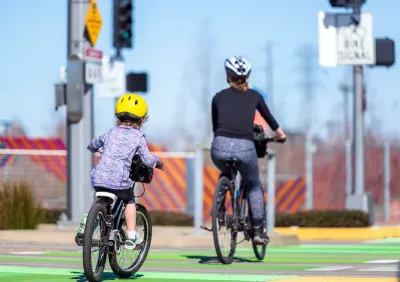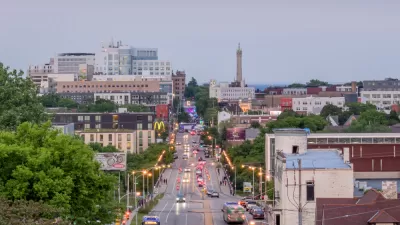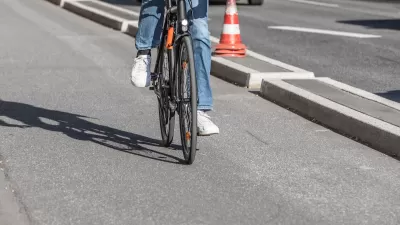A lack of safe bike and pedestrian infrastructure can drive young families away from places that don’t accommodate car-free residents.

In an essay in Streetsblog USA, Ned Resnikoff highlights how even cities with ostensibly progressive policies often fail to provide safe pedestrian and bike infrastructure, sometimes driving away residents who want access to safe, convenient bike and pedestrian infrastructure.
In famously liberal Berkeley, California, where Resnikoff lives, city officials are “consistently choosing speed and convenience for automobiles over safety for pedestrians and people on bikes,” Resnikoff says. “[T]he final straw for me came when, after several years of pitched battle, city officials killed a modest plan to improve biker safety on Hopkins Street. That is when it finally became obvious to me that the city was simply unwilling to get serious about ensuring that all residents could move about the city safely, whether they drive a car, or not.”
As Resnikoff points out, “Unfortunately, Berkeley is far from unique in that regard. As traffic violence has climbed over the past few years, a number of ostensibly progressive, climate-friendly cities have demonstrated that they are uninterested in taking even modest steps to support non-drivers.”
Resnikoff writes that this can motivate families like his, who chose to move to Emeryville for several reasons including that city’s commitment to safe bike infrastructure, to relocate or avoid certain cities. “Safe streets are, unequivocally, critical family-friendly policy. Progressive cities should be rushing to lead on this issue.”
FULL STORY: Essay: Why Even The Most Progressive Cities Are Failing Their Car-Free Residents

Planetizen Federal Action Tracker
A weekly monitor of how Trump’s orders and actions are impacting planners and planning in America.

Chicago’s Ghost Rails
Just beneath the surface of the modern city lie the remnants of its expansive early 20th-century streetcar system.

San Antonio and Austin are Fusing Into one Massive Megaregion
The region spanning the two central Texas cities is growing fast, posing challenges for local infrastructure and water supplies.

Since Zion's Shuttles Went Electric “The Smog is Gone”
Visitors to Zion National Park can enjoy the canyon via the nation’s first fully electric park shuttle system.

Trump Distributing DOT Safety Funds at 1/10 Rate of Biden
Funds for Safe Streets and other transportation safety and equity programs are being held up by administrative reviews and conflicts with the Trump administration’s priorities.

German Cities Subsidize Taxis for Women Amid Wave of Violence
Free or low-cost taxi rides can help women navigate cities more safely, but critics say the programs don't address the root causes of violence against women.
Urban Design for Planners 1: Software Tools
This six-course series explores essential urban design concepts using open source software and equips planners with the tools they need to participate fully in the urban design process.
Planning for Universal Design
Learn the tools for implementing Universal Design in planning regulations.
planning NEXT
Appalachian Highlands Housing Partners
Mpact (founded as Rail~Volution)
City of Camden Redevelopment Agency
City of Astoria
City of Portland
City of Laramie





























